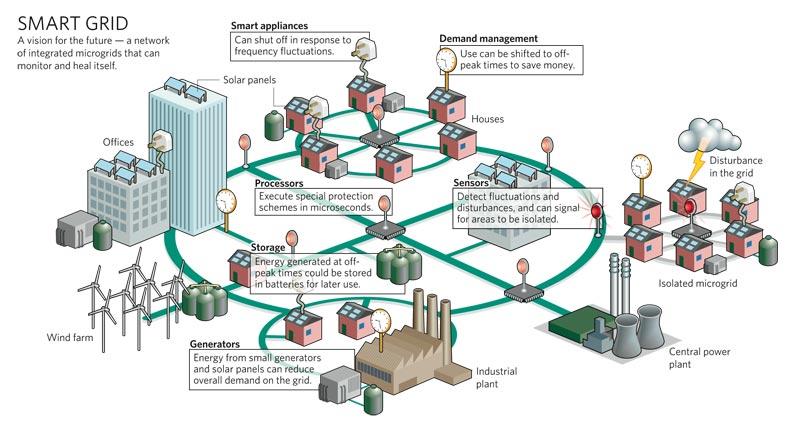Our energy networks in the UK and across Europe have worked over the past century without the smart grid, but that will not be the case with the continued influx of a diverse range of sources and demands, such as renewables, electric cars and domestic sources of power. Furthermore the efficiencies smart grid provides will have considerable impact on Europe’s ability to provide an uninterrupted energy supply whilst meeting energy legislation. The return on investment is getting clearer for smart grid, without it we will be unable to ensure reliability and that new energy sources meet demand. Communication networks, of course, are central to a smart grid.
Once a subject for all but the most technical of society, the frequency debate has become mainstream and is growing with consumer interest in the digital switch over and 3G, then 4G services from mobile providers. In the last few weeks we have already seen Ofcom talking about 5G and how this will provide capacity for what is expected to be an already oversubscribed 4G network.
I am often asked whether the competition with mobile operators and broadcasting services will ultimately limit the possibilities and even stability of a smart grid. The answer is no, as long as we manage it carefully.
For a smart grid to operate effectively it needs both a fixed network, including the traditional power lines, as well as wireless capability. It is the latter where the debate over frequencies comes in. The utilities are already arguing through the Joint Radio Company Ltd. (JRC) they should receive a dedicated spectrum for free. The JRC is a joint venture company of National Grid plc. (the UK electricity transmission and gas transmission and distribution operator) and the Energy Networks Association Ltd, representing UK gas and electricity transmission and distribution companies. There is nothing stopping the utilities competing with broadcasters and network operators for the frequency spectrums out there. However, a smart grid does not require the biggest, fastest frequency and there is little point competing for something that will provide another user a far greater return on investment. Mobile operators are expected to bid billions for the 4G network, the utilities cannot afford to match this and it does not make business sense to do so.

To date, smart grid operators have chosen between purchasing licenses or using unlicensed networks. The approach is ad-hoc and does not set us up for a future proof smart grid. In fact, it has similarities to the piecemeal way the national grid was built – a system we are now trying to update as it is not future proofed and is struggling under the demands put upon it by developments in energy generation and use.
Ultimately free access to part of the spectrum is the answer, but why give it to utilities for free? Grid stability and energy security is at the heart of this debate, and without a smart grid we won’t be able to effectively manage new sources of supply and electricity demands. Instead, we will find ourselves in a situation with black-outs and unreliable energy supply, simply not acceptable in the 21st century. The industry needs to work together to prove the strains on the network and demonstrate how the influx of renewables and new technologies is putting unprecedented strain on our existing national grid. Furthermore, we as an industry need to show the benefits of a smart grid, how this is a future-proof technology that will not only provide a reliable energy source but enable us to meet legislation on energy use from Europe.
The enormous benefit of smart grid is the ability to make the best use of local renewable sources without the cost and disruption of updating legacy systems with expensive updates to existing physical infrastructure, such as laying bigger electrical cables and updating sub-stations to give greater capacity.
The European Commission has already concluded that grid operators should have dedicated access to the spectrum, but it is yet to be finally approved and the decision around free access remains undecided. This is not just applicable to the UK market; it is a European wide decision and more importantly, opportunity. The right decision will transform the European energy market and enable us to meet legislation and make a real difference to the way we produce and use energy. For the industry to move forward; for the technology to develop; and for the consumer to feel the benefit the availability of this spectrum needs to be agreed now.
Energy security is one of the biggest issues facing our society, and without a secure energy supply how will we even charge our mobile phones or watch television?
Andrew Jones is Managing Director for Europe, the Middle East and Africa at S&C Electric Company, a US-based provider of equipment and services for electrical power systems.




Project to investigate hybrid approach to titanium manufacturing
What is this a hybrid of? Superplastic forming tends to be performed slowly as otherwise the behaviour is the hot creep that typifies hot...